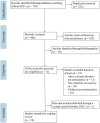Eco-anxiety in children: A scoping review of the mental health impacts of the awareness of climate change
- PMID: 35959069
- PMCID: PMC9359205
- DOI: 10.3389/fpsyg.2022.872544
Eco-anxiety in children: A scoping review of the mental health impacts of the awareness of climate change
Abstract
Background: Youth are increasingly aware of the negative effects of climate change on the planet and human health, but this knowledge can often come with significant affective responses, such as psychological distress, anger, or despair. Experiencing major "negative" emotions, like worry, guilt, and hopelessness in anticipation of climate change has been identified with the term eco-anxiety. Emerging literature focuses on adults' experience; however, little is known about the ways in which children and youth experience eco-anxiety.
Objectives: The aim of this review was to: (1) identify the available evidence on the topic of eco-anxiety in children, (2) clarify the mental health consequences brought by the awareness of climate change in this population, and (3) identify knowledge gaps in the literature and considerations for future research.
Methods: Given that the research on the topic of eco-anxiety in children is limited, that there are very few randomized controlled trials, and that the goal is not to analyze individual studies in-depth, a scoping review was used. Keywords pertaining to the themes of eco-anxiety, climate change and children (aged < 18 years) were used as search terms in five databases. Journal articles using qualitative and quantitative methods, as well as gray literature were examined by two independent reviewers. A descriptive-analytical method was used to chart the data that emerged from the literature. Eighteen articles were considered in the final analysis.
Results: Evidence confirms that children experience affective responses and eco-anxiety in reaction to then awareness of climate change. Mental health outcomes include depression, anxiety, and extreme emotions like sadness, anger, and fear. Youth from vulnerable communities, like indigenous communities, or those who have strong ties to the land are often identified as being emotionally impacted by climate change. The literature analyzed also describes how children and youth are coping with eco-anxiety, including maladaptive (e.g., denial) and adaptive responses (such as constructive hope, used as a positive coping mechanism). Preliminary considerations for parents, teachers and educators, mental health care providers, school systems, adults and people of power include adding age-appropriate climate education to the school curriculum, considering youth's emotions, and promoting healthy coping through empowerment. Important gaps exist in the definition of eco-anxiety in youth, as various characterizations of this emerging concept are found across articles.
Keywords: children; climate change; eco-anxiety; mental health; scoping review; youth.
Copyright © 2022 Léger-Goodes, Malboeuf-Hurtubise, Mastine, Généreux, Paradis and Camden.
Figures
References
-
- Akresh R. (2016). Climate change, conflict, and children. Future Child. 26, 51–71. 10.1353/foc.2016.0003 - DOI
-
- Arcanjo M. (2019). Eco-Anxiety: Mental Health Impacts of Environmental Disasters and Climate Change. Climate Institute. Available online at: http://climate.org/eco-anxiety-mental-health-impacts-of-environmental-di... (accessed November 8, 2020).
-
- Arksey H., O'Malley L. (2005). Scoping studies: towards a methodological framework. Int. J. Soc. Res. Methodol. 8, 19–32. 10.1080/1364557032000119616 - DOI
-
- Asah S. T., Bengston D. N., Westphal L. M., Gowan C. H. (2018). Mechanisms of children's exposure to nature: predicting adulthood environmental citizenship and commitment to nature-based activities. Environ. Behav. 50, 807–836. 10.1177/0013916517718021 - DOI
Publication types
LinkOut - more resources
Full Text Sources


